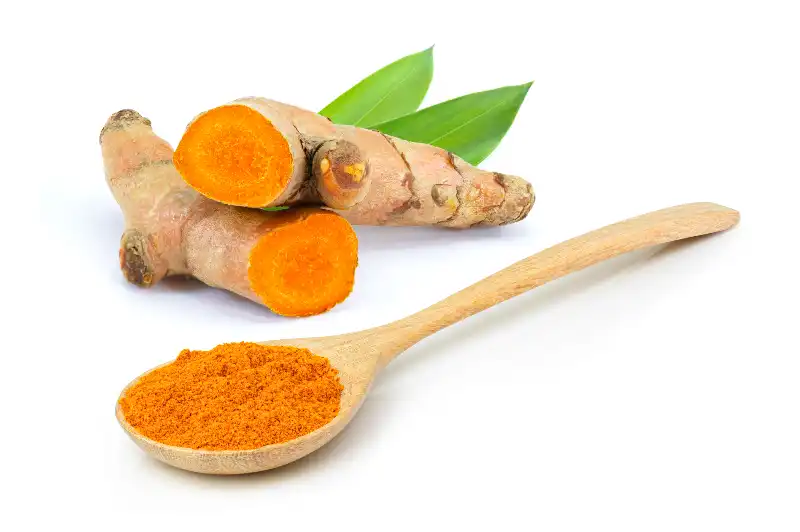Last updated on July 27th, 2022
In India, turmeric is one of the most widely used spices. . Its scientific name is Curcuma Longa which comes from the Ginger family. Turmeric or
People are using Haldi for both edible and medicinal purposes for centuries
Its medicinal uses in Ayurveda are notable to treat multiple health conditions. Haldi or turmeric has multiple health benefits because of the Curcumin, a compound found in it.
Haldi or turmeric root is popular for its coloring and aromatic properties. It gives a yellow color to the food and has a strong black pepper kind of bitter taste. Turmeric powder is a popular spice in the kitchen.
Curcumin in turmeric has strong anti-inflammatory and antioxidant properties. It is the main compound that gives it medicinal properties.
Nutritional Value of Turmeric or Haldi
This table represents several nutrients and their amounts present in 100 g of Haldi or Turmeric:
| Nutritional Value of Haldi | ||||
|---|---|---|---|---|
| Nutrients (in 100 grams of Haldi) | Its amount | |||
| Protein | 9.68gm | |||
| Fat | 3.25 grams | |||
| Carbs | 67.14gm | |||
| Calories | 312kcal | |||
| Sugar | 3.21gm | |||
| Fiber | 22.7gm | |||
| Calcium | 168 mg | |||
| Iron | 55 mg | |||
| Magnesium | 208 mg | |||
| Phosphorus | 299 mg | |||
| Potassium | 2080 mg | |||
| Zinc | 4.5 mg | |||
| Copper | 1.3 mg | |||
| Vitamin E | 4.43 mg | |||
In addition, 1tbsp Haldi provides
- 26 percent of daily manganese needs
- 16 percent of daily iron
- 5 percent of daily potassium
- 3 percent of daily vitamin C
There are many other nutrients like Vitamin C, B1, B2, B3, B5, B6, B12, Folate, Tryptophan, Leucine, Lysine, etc. are also found in Haldi.
Glycemic Index and Glycemic Load
The Glycemic Index of turmeric is zero which makes it safe for blood sugar levels.
Health Benefits of Turmeric or Haldi
People use Haldi for pain, skin treatment, skin remedies, and swelling in every Indian household. These medicinal benefits of turmeric were received from our elders. These benefits are mentioned in Ayurveda and traditional treatment techniques. Turmeric’s health benefits are:
Anti-Inflammatory
Curcumin in turmeric is responsible for its anti-inflammatory qualities. It inhibits or blocks lipoxygenase (LOX), inducible nitric oxide synthase (iNOS), and cyclooxygenase-2 (COX-2) and acts as an inflammation inhibitor.Haldi is used to treat or ease inflammation caused by arthritis, muscle sprain, cramps, wound, and other muscular pains because of these qualities. It gives relief to inflammation.
Also Read: Watermelon Safe for Diabetics?
Helps in Pain Relief
It is also considered a pain reliever as it eases pain by using it locally. Multiple ways of using it include as a pain reliever like patches, bandages, and having it orally.
Also Read: Grapes Good for Diabetics?
Antiseptic
Because of its antiseptic properties, turmeric is also used in many antiseptic and antibacterial ointments. It is applied to wounds, boils, insect bites, rashes, and bruises..
Also Read: Coconut Water for Diabetics
Anti-Oxidant
Haldi is a powerful antioxidant that helps to reduce the risk of a variety of health conditions, including cancer and heart disease.
Also Read: Is Makhana Good For Diabetics?
Helps in Diabetes
Haldi has zero GI and low sugar which helps in diabetes. Its curcumin substance inhibits the inflammatory cytokines that maintain blood glucose levels. It also helps delay type 2 diabetes. Furthermore, it reduces triglyceride levels.
Also Read: Benefits of Amla
Good for Heart Health
Curcumin, an antioxidant of turmeric, prevents cardiovascular and heart conditions. It reduces the risk of stroke, and atherosclerosis and reduces cholesterol levels.
Also Read: Dragon Fruit Good For Diabetes?
Good for Skin & Anti Aging
It is a blood purifier that is good for the skin. It also helps in acne, pimples, dark circles, itching, allergy, eczema, scars, or other skin conditions. Its purifying effect gives a glow to the skin. Curcumin helps in increasing the growth of new cells and mitigates the effect of cell damage. It helps with wrinkles and fine lines.
Also Read: Fruits good For Diabetes
Reduced Risk of Cancer
Curcumin reduces the growth of cancerous cells and stops them from spreading. It helps lower the risk of cancer.
Helps in Depression
Turmeric also benefits people with depression. The substance Curcumin increases dopamine and serotonin, neurotransmitters responsible for good mood and happiness. It also helps reduce symptoms by BDNF levels (brain-derived neurotrophic factors levels).
Also Read: Sugar-free Biscuits For Diabetics?
Good for Digestion
It’s also good for digestion. Its antioxidant and anti-inflammatory properties help the digestive system. It helps in bloating, gut permeability, and gut inflammation. It improves digestion as well.
Also Read: Top 6 Dry Fruits For Diabetics?
Good for the Liver
Its antioxidant property prevents the liver from toxin-like potent drugs of many diseases. It also reduces the fat accumulation in the liver.
Also Read: Is Apricots Good For Diabetics?
Boosts Immunity
Turmeric is known for its antibacterial, antiviral, and antifungal qualities. This helps to minimize the chances of infections thus boosting immunity.
Also Read: Benefits of Sabja Seeds
Helps in Fever and Common Cold
Taking a teaspoon of turmeric powder with milk helps in fever and the common cold. It reduces running nose, congestion, and the common cold.
Also Read: Health Benefits of Papaya
Good for Bones
Turmeric’s health benefits include the relief of joint pains. Turmeric is said to be good for arthritis and joint pain. The compound Curcumin helps prevent bone tissues and strengthens them.
Also Read: Multigrain Atta For Diabetics
Boosts Brain Health & Helps in Alzheimer’s
Turmeric induces secretion of BDNF, a brain hormone, that reduces degeneration in the brain and improves neuron functioning. In addition, it also helps in preventing Alzheimer’s disease by clearing amyloid plaques responsible for the condition.
Also Read: Sweet Corn Good for Diabetics?
Prevents Cataracts & Glaucoma
Turmeric helps prevent vision loss. Antioxidants are good for the eyes and Haldi helps prevent cataracts and glaucoma because of this property.
Also Read: Fish For Diabetics?
How to Consume Turmeric
For daily benefits, 5 tsp of turmeric is advisable to consume. One can fulfill this daily requirement in many ways:
- It can be used as a key spice in many dishes to add taste and color to them.
- Golden Milk or Haldi Doodh is one of the best ways to meet your daily turmeric needs. It has multiple health benefits.
- Turmeric is not easy to absorb in the body so to increase its absorption effect, take it with black pepper which has a substance called piperine. It enhances its absorption.
- It is also available as a supplement as capsules, extracts, and liquids.
Also Read: Coconut Milk for Diabetics?
Side-Effects of Turmeric
Consuming turmeric in an adequate quantity has many health benefits but its overdose can cause multiple side effects. They can be:
- Its overconsumption can cause many gastric issues like acid reflux and diarrhea. It can also increase GERD stomach issues.
- It can cause headaches, nausea, or dizziness.
- Haldi can lower blood sugar too much in diabetic people.
- Overconsumption of turmeric can slow blood clotting and can be fatal to people with bleeding disorders.
Also Read: Peanuts Good for Diabetes?
Can Diabetics Eat Turmeric?
Turmeric is safe for diabetic people as it has zero GI and low sugar content. The active compound curcumin, found in turmeric, is said to be very effective in lowering blood sugar levels and reducing insulin resistance in the blood. It mitigates diabetes complications by strengthening beta cell functioning. It also reduces the level of triglycerides and cholesterol levels.
Also Read: Is Jaggery Good For Diabetics?
Conclusion
Turmeric or Haldi has been used in the traditional Indian medicine system for centuries. It is one of the key components in Ayurveda that cures and prevents multiple ailments. Its native to Southeast Asia and is extensively mentioned in Indian and Chinese medical practices.
It has volatile oils like turmerone, Atlante, zingiberene and dimethoxy curcumin, bisdemethoxycurcumin that give it medicinal properties.
It is antibacterial, anti-inflammatory, antifungal, antioxidant, antiviral, and antiseptic that aids in numerous health problems. Haldi is also used in many home remedies for skin health. Haldi is an important part of Indian weddings as well that gives the bride or groom a perfect glow and beauty as Ubtan or turmeric paste.
Golden Milk or Haldi Doodh is a one-stop solution in each household for many conditions of skin, pain, cold, and fever. It can be called Magical Spice.
Read More: Is Garlic Good For Diabetes?
FAQs:
Who should avoid turmeric consumption?
Although an adequate quantity of turmeric is not harmful to anyone still its qualities can trigger a few health conditions. People with conditions like GERD (gastroesophageal reflux disease), bleeding disorders, pregnancy, gall bladder conditions, liver problems, presurgery state, or infertility should avoid consumption of turmeric or Haldi.
Can we take turmeric every day?
Overconsumption of turmeric may impact your health negatively and can cause side effects like acid reflux, headache, dizziness, low blood sugar, stomach problems, diarrhea, etc. As per World Health Organization, you can consume 0-3mg turmeric per kilogram depending on your body weight. Over the advised quantity can be harmful.
Is turmeric good for diabetes?
Low GI, low sugar content, and presence of antiinflammatory compound curcumin make it safe for diabetic people. The presence of curcumin reduces insulin resistance, triglycerides levels, cholesterol, and eventually blood sugar levels. Turmeric also impacts beta cells positively which helps diabetic people. Although it is advised to take after consultation with a doctor as it also can lower the blood sugar too much when taken with antidiabetic medicines.
How much turmeric can benefit a diabetic?
Turmeric is good for diabetic people because of the presence of curcumin, an anti-inflammatory compound. It is said to improve cholesterol levels and insulin sensitivity which eventually helps blood sugar control. Ideally, 1000-2000 mg of turmeric can be beneficial depending upon the person and needs.
Reference
https://www.healthline.com/nutrition/top-10-evidence-based-health-benefits-of-turmeric#TOC_TITLE_HDR_12
https://www.webmd.com/vitamins/ai/ingredientmono-662/turmericLast Updated on by Dr. Damanjit Duggal
Disclaimer
This site provides educational content; however, it is not a substitute for professional medical guidance. Readers should consult their healthcare professional for personalised guidance. We work hard to provide accurate and helpful information. Your well-being is important to us, and we value your feedback. To learn more, visit our editorial policy page for details on our content guidelines and the content creation process.

 English
English















